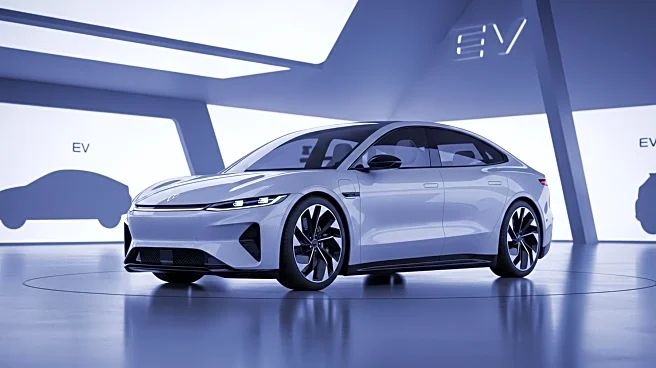What's Happening?
Tesla has introduced a new, more affordable electric vehicle model, expected to be a stripped-down variant of the Model Y crossover, with production ramping up in late 2025. This move comes as Tesla faces fierce competition from Chinese EV makers and traditional automakers. The new model is anticipated to start in the mid-$30,000 range, significantly lower than the current Model Y's entry price of approximately $45,000. Tesla aims to broaden its market by hitting a lower price point, potentially around $30,000-$35,000. The company is also focusing on other projects, including a second-generation Roadster sports car, an electric Semi truck, and a 'Cyber SUV'. Tesla's strategy involves adapting to market realities by lowering prices, refreshing old models, and aggressively branching into software and AI.
Why It's Important?
The introduction of a more affordable Tesla model is crucial as the company faces declining sales and increased competition in the EV market. By offering a lower-cost option, Tesla hopes to attract new buyers and stabilize its deliveries. The success of this new model could significantly impact Tesla's growth and valuation, similar to the effect the Model 3 had on the company's business. Additionally, Tesla's focus on autonomous ride-hailing and other projects could add substantial value beyond car sales, potentially reigniting investor enthusiasm despite the core EV slowdown.
What's Next?
Tesla plans to start volume production of the new affordable model by late 2025, with first deliveries expected around Q4 2025. The company is also expanding its autonomous ride-hailing trials, with regulatory approvals in several states. Tesla's future growth will depend on the success of its new model and ambitious projects like robotaxis and the Semi truck. The company aims to deploy a fleet of autonomous 'Cybercab' taxis, with plans to have ride-hailing in half of U.S. population areas by year-end.
Beyond the Headlines
Tesla's strategy reflects a broader shift in the auto industry towards more affordable and technologically advanced vehicles. The company's focus on software, FSD/robotics, and energy storage highlights its ambition to lead in key growth sectors beyond traditional car manufacturing. However, Tesla's short-term success hinges on the new model's performance in the market, and any launch issues could impact investor confidence.









